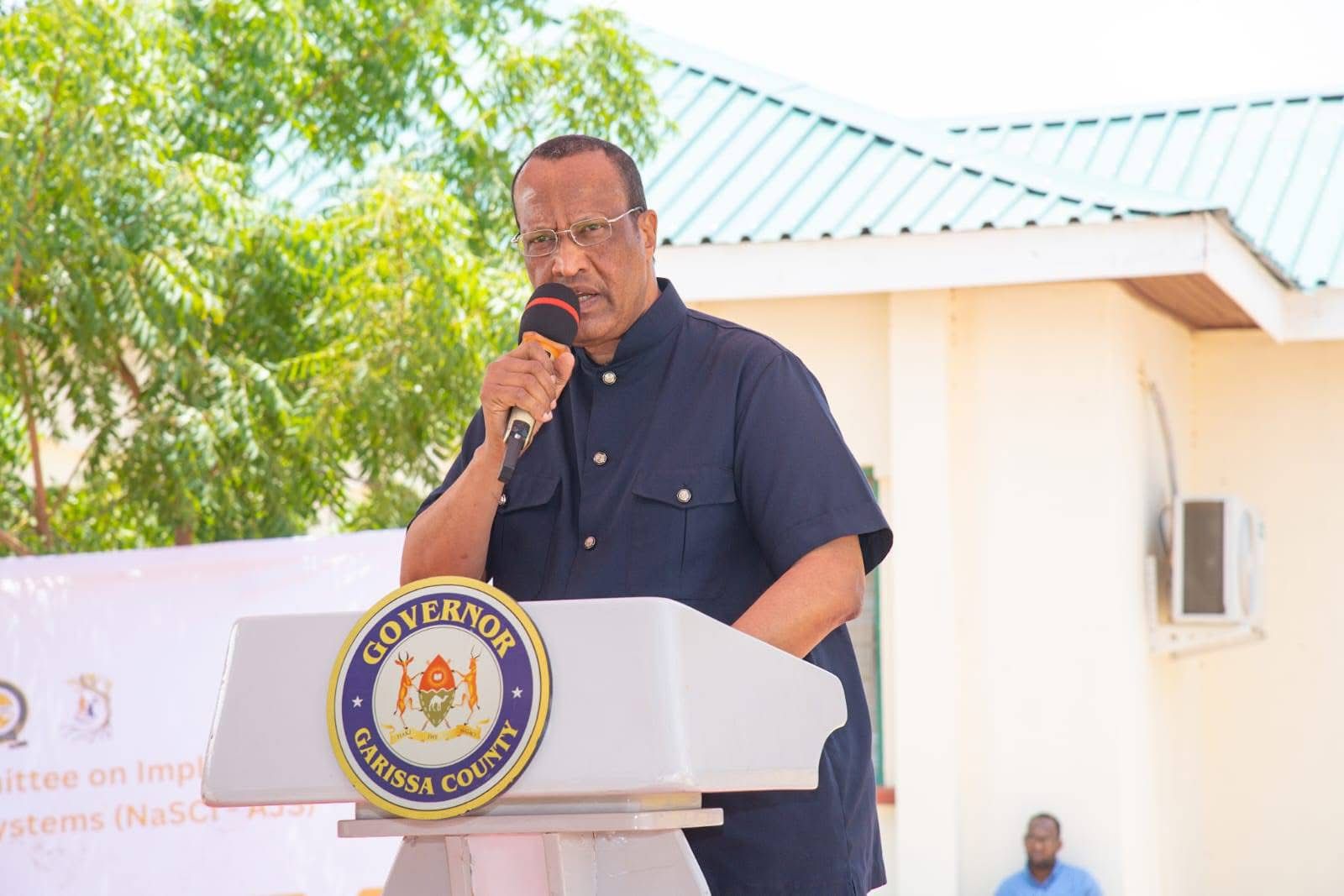
CJ Koome launches AL-Islaah Centre in Garissa
The Chief Justice said the AL-Islaah Centre would be a cultural symbol of peace, dialogue and unity
Koome reiterated the critical role played by the AJS in peacebuilding and conflict transformation.
In Summary

Audio By Vocalize
 Chief Justice Martha Koome, Garissa Governor Nathif Jama and other
leaders at the Garissa law courts /STEPHEN ASTARIKO
Chief Justice Martha Koome, Garissa Governor Nathif Jama and other
leaders at the Garissa law courts /STEPHEN ASTARIKO
 Garissa Governor Nathif Jama speaking during the launch of
the Alternative Justice System (AJS) Centre.
Garissa Governor Nathif Jama speaking during the launch of
the Alternative Justice System (AJS) Centre.
Access to justice has been enhanced for residents in Garissa with the launch of the Alternative Justice System Centre.
On Tuesday, Chief Justice Martha Koome officially launched the AJS model at the Garissa Law Courts, paving the way for locals to access justice through traditional, alternative dispute resolution methods.
Koome reiterated the critical role played by the AJS in peacebuilding and conflict transformation.
“The term Al-Islaah, meaning ‘reconciliation’ in Arabic, captures the spirit of this centre. It will be a place where the wisdom of elders, the moral authority of religious leaders and the knowledge of trained mediators converge to offer citizens solutions that heal relationships rather than deepen divisions,” she said.
The CJ called on residents to embrace the AJS framework as their own and to use the Al-Islah Justice Centre as a trusted space for peacebuilding.
She said the future of justice in Kenya and particularly in Garissa, lies in embracing this approach, noting that courts alone cannot carry the weight of all disputes, especially in a county where vast distances, illiteracy and poverty present barriers to accessing the formal system.
“By strengthening AJS, we bring justice to the people's doorsteps, in their language, within their cultural frameworks and at minimal cost. This is not only a practical necessity but also a constitutional imperative under Article 48, which obligates the state to ensure access to justice for all persons,” she said.
For areas such as Garissa—where land conflicts, resource-based disputes and cross-border tensions with neighbouring counties and countries, such as Somalia, are prevalent—justice must be preventive as it is curative, she noted.
“By empowering elders, religious leaders and community actors to resolve disputes early and fairly, we reduce the risk of violence, we strengthen cohesion and we give our young people a future free from cycles of revenge and retaliation.”
Koome highlighted the importance of promoting inclusive and rights-based justice, ensuring that women, youth, persons with disabilities and minority groups are not just passive beneficiaries but active agents in justice delivery.
“This is a landmark moment not just for Garissa, but for Kenya as a whole. The AJS model ensures justice is accessible, community-driven and reflective of our cultural contexts. I commend Governor Nathif Jama for his leadership and for placing Garissa at the forefront of this transformative system.”
Residents and members from civil society organisations welcomed the development, which they said would enhance inclusive and restorative justice.
Abdihakim Shurie, county coordinator for human rights organisation Muhuri, described the development as a "significant milestone and a timely step in the journey toward inclusive, accessible and culturally appropriate justice for all members of our community".
"For years, residents in Garissa—especially those in marginalised and remote areas—have faced numerous challenges in accessing the formal justice system, including high costs, long distances, language barriers and a lack of trust in formal judicial processes. This AJS centre has come at the right time," Shurie said.
Another activist, Muktar Dahir, said the AJS will reduce the backlog of cases in formal courts by resolving minor disputes and civil matters at the community level.
"The AJS centre offers a practical, people-centred solution. By integrating traditional dispute resolution mechanisms with constitutional safeguards and human rights principles, the AJS will help to provide timely and affordable justice, particularly for those who have been historically underserved," he said.
Dahir added that the move will promote reconciliation, healing and community cohesion by emphasising restorative rather than punitive justice.
Resident Ambia Abdi said the centre's location within Garissa was significant, noting that the region has a rich history of indigenous conflict resolution practices that have maintained peace across generations.
Beyond reducing the heavy backlog of cases in conventional courts, the AJS model will restore trust in justice systems by embedding traditional conflict resolution within the formal judicial framework—ensuring that justice is not only done but also seen to be fair and culturally relevant.

The Chief Justice said the AL-Islaah Centre would be a cultural symbol of peace, dialogue and unity